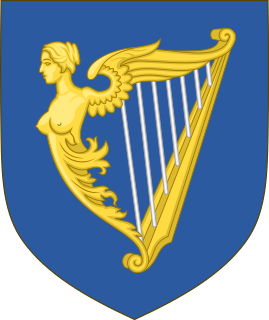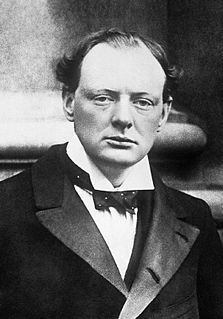The Loyalist Anti-Repeal Union was an Irish unionist organisation established in 1886 in Ulster. It was created by the most influential Protestant groups - landowners, businessmen, churchmen - in opposition to Home Rule for Ireland. The movement grew rapidly and was helped along by the support of Conservative Party MP Lord Randolph Churchill who had decided 'to play the Orange card'. (Essentially Churchill was trying to use Ulster unionism to weaken Gladstone's Liberal Party, in favour of the Tories [ citation needed ]. Churchill also famously said that the movement would receive support in England, and "Ulster will fight, Ulster will be Right").

The Ulster Unionist Party (UUP) is a unionist and conservative political party in Northern Ireland. Having gathered support in Ulster, the northern province in Ireland, during the late-nineteenth and early-twentieth centuries, the party governed Northern Ireland between 1921 and 1972. The UUP and its predecessors have been the traditional Unionist voice in Ireland. It was supported by most unionist voters throughout the conflict known as the Troubles, during which time it was often referred to as the Official Unionist Party (OUP). Between 1905 and 1972, its peers and MPs took the Conservative whip at Westminster, in effect functioning as the Northern Irish branch of the Conservative and Unionist Party. This arrangement came to an end in 1972 over disagreements over the Sunningdale Agreement. The two parties have remained institutionally separate ever since, with the exception of the 2009–2012 Ulster Conservatives and Unionists electoral alliance.

Andrew Bonar Law was a British Conservative politician who served as Prime Minister of the United Kingdom from October 1922 to May 1923.

Irish nationalism is a nationalist political movement which, in its broadest sense, asserts that the people of Ireland should govern Ireland as a sovereign state. Since the mid-19th century, Irish nationalism has largely taken the form of cultural nationalism based on the principles of national self-determination and popular sovereignty. Irish nationalists during the 18th, 19th, and 20th centuries such as the United Irishmen in the 1790s, Young Irelanders in the 1840s, the Fenian Brotherhood during the 1880s, Fianna Fáil in the 1920s, and Sinn Féin styled themselves in various ways after French left-wing radicalism and republicanism. Irish nationalism celebrates the culture of Ireland, especially the Irish language, literature, music, and sports. It grew more potent during the period in which all of Ireland was part of the United Kingdom, which led to most of the island gaining independence from the UK in 1921.

The Irish Parliamentary Party was formed in 1874 by Isaac Butt, the leader of the Nationalist Party, replacing the Home Rule League, as official parliamentary party for Irish nationalist Members of Parliament (MPs) elected to the House of Commons at Westminster within the United Kingdom of Great Britain and Ireland up until 1918. Its central objectives were legislative independence for Ireland and land reform. Its constitutional movement was instrumental in laying the groundwork for Irish self-government through three Irish Home Rule bills.
The Progressive Unionist Party (PUP) is a small unionist political party in Northern Ireland. It was formed from the Independent Unionist Group operating in the Shankill area of Belfast, becoming the PUP in 1979. Linked to the Ulster Volunteer Force (UVF) and Red Hand Commando (RHC), for a time it described itself as "the only left of centre unionist party" in Northern Ireland, with its main support base in the loyalist working class communities of Belfast.
The Curragh incident of 20 March 1914, sometimes known as the Curragh mutiny, occurred in the Curragh, County Kildare, Ireland. The Curragh Camp was then the main base for the British Army in Ireland, which at the time still formed part of the United Kingdom of Great Britain and Ireland. Ireland was scheduled to receive a measure of devolved government, which included Ulster, later in the year. The incident is important in 20th-century Irish history, and is notable for being one of the few occasions since the English Civil War in which elements of the British military openly intervened in politics. It is widely thought of as a mutiny, though no orders actually given were disobeyed.
David Thomas Kerr is a politician from Northern Ireland who is the Chairman of the UK-wide Third Way.

William "Bill" Craig was a Northern Irish politician best known for forming the Unionist Vanguard movement.
Events in the year 1912 in Ireland.

The Ulster Third Way was the Northern Ireland branch of the Third Way and was organised by David Kerr, who had previously campaigned as an 'independent Unionist' as well as for the British National Front. It followed an Ulster nationalist ideology.

The Irish Unionist Alliance (IUA), also known as the Irish Unionist Party, Irish Unionists or simply the Unionists, was a unionist political party founded in Ireland in 1891 from a merger of the Irish Conservative Party and the Irish Loyal and Patriotic Union to oppose plans for home rule for Ireland within the United Kingdom of Great Britain and Ireland. The party was led for much of its existence by Colonel Edward James Saunderson and later by William St John Brodrick, Earl of Midleton. In total, eighty-six members of the House of Lords affiliated themselves with the Irish Unionist Alliance, although its broader membership was relatively small.

Ulster nationalism is a minor school of thought in the politics of Northern Ireland that seeks the independence of Northern Ireland from the United Kingdom without joining the Republic of Ireland, thereby becoming an independent sovereign state separate from both.

Ulster loyalism is a strand of Ulster unionism associated with working class Ulster Protestants in Northern Ireland. Like unionists, loyalists support the continued existence of Northern Ireland within the United Kingdom, and oppose a united Ireland. Unlike other strands of unionism, loyalism has been described as an ethnic nationalism of Ulster Protestants and "a variation of British nationalism". Loyalists are often said to have a conditional loyalty to the British state so long as it defends their interests. They see themselves as loyal primarily to the Protestant British monarchy rather than to British governments and institutions, while Garret FitzGerald argued they are loyal to 'Ulster' over 'the Union'. A small minority of loyalists have called for an independent Ulster Protestant state, believing they cannot rely on British governments to support them. The term 'loyalism' is usually associated with paramilitarism.
The British Ulster Dominion Party was a minor political party in Northern Ireland during the 1970s.

The All-for-Ireland League (AFIL) was an Irish, Munster-based political party (1909–1918). Founded by William O'Brien MP, it generated a new national movement to achieve agreement between the different parties concerned on the historically difficult aim of Home Rule for the whole of Ireland. The AFIL established itself as a separate non-sectarian party in the House of Commons of the United Kingdom of Great Britain and Ireland, binding a group of independent nationalists MPs to pursue a broader concept of Irish nationalism, a consensus of political brotherhood and reconciliation among all Irishmen, primarily to win Unionist consent to an All-Ireland parliamentary settlement.
Events from the year 1886 in the United Kingdom.

The Irish Home Rule movement was a movement that campaigned for self-government for Ireland within the United Kingdom of Great Britain and Ireland. It was the dominant political movement of Irish nationalism from 1870 to the end of World War I.

Winston Churchill was first elected to the UK Parliament at the 1900 general election as one of two Conservative Party members representing the Oldham constituency. He took his seat in the House of Commons in February 1901 but soon became critical of the Conservative government on a number of issues. On 31 May 1904, he formally crossed the floor of the Commons to join the opposition Liberals, remaining a party member until March 1924.
In 20th century politics, Winston Churchill (1874–1965) was one of the world's most influential and significant figures. He was Prime Minister of the United Kingdom from 1940 to 1945, when he led the country to victory in the Second World War, and again from 1951 to 1955. Apart from two years between 1922 and 1924, he was a Member of Parliament (MP) from 1900 to 1964. Ideologically an economic liberal and imperialist, he was for most of his career a member of the Conservative Party, and its leader from 1940 to 1955. He was a member of the Liberal Party from 1904 to 1924.